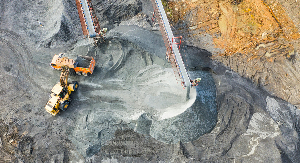The Ghana National Association of Rock Miners (GNARoM) has appealed to the Government to reconsider its decision to halt the issuance of prospecting licences for small-scale mining in the country.
Rather, it urged the government to address the bureaucratic system associated with acquiring such licenses to mitigate the illegal prospecting and its related activities.
The government, early this week, said it was considering halting the issuance of prospecting licences for small-scale mining as part of measures to overhaul the mining sector and curb illegal mining, also known as “galamsey.”
Addressing a news conference in Accra, Dr Twum Barimah, President, GNARoM, said such a decision would create “deep confusion” within the mining sector.
He dispelled claims that the issuance of prospecting licences for small-scale mining was the major cause of “galamsey.”
According to him, the reason for the rise in the illegal mining activity was the hijacking of the small-scale mining by some political figures, adding that such persons circumvented the mining laws to their advantage.
“When we were young guys, when I was about 15, we went into mines, and there was a scatter. The government brought a system where soldiers would come to the site, chasing people. Some fell into the pit, some of the soldiers got injured, and the Police died from that incident.
“So, promulgation of the mining law stopped that system, and the small-scale mining law was introduced. It helped us to a certain level; we formed a small-scale mining association, which also brought it to a certain level,” Dr Barimah said.
He added that: “Now, you know the reason why illegal mining has come out so much? It is because the land, which was demarcated for small-scale mining activity has finished, and some government comes in, changing the rules, but not the law.
“They are not changing the law, they adopted some rules to hijack small-scale mining activities. So, government stopping giving licences or signing licences will lead to a very deep confusion,” he stressed.
Additionally, Dr Barimah indicated that the delay in acquiring these licenses was also a major contributory factor to the galamsey activities and urged the government to address it.
“We are also having a problem where an application will be put to the Mineral Commission, and it will take years for us to get the licence. It will lead the person to go into illegality,” he said.
He expressed GNARoM’s commitment to responsible, environmentally friendly, and sustainable mining, indicating that about 90-95 per cent of its operations occurred underground, limiting destruction of the environment.
Dr Barimah also lauded the establishment of the Goldbod, which seeks to regulate the gold industry, stabilise the cedi, and maximise revenue from gold exports.
He described the Goldbod as a “game-changer” for the Ghanaian economy and pledged the Association’s support to the board to realise its objectives.
“We believe that hard rock mining holds the key to Ghana’s economic growth and development, and we are eager to collaborate with the Ghana Goldbod to make this vision a reality,” he said.
Dr Barimah also pledged the Association’s readiness to collaborate with the Goldbod and other relevant statutory bodies to restore and promote sustainable mining practices in the country.
Eric Offei, Legal Adviser for GNARoM, said as an Association, it was committed to ensuring that its members operated within the established legal framework to ensure sustainable and environmentally friendly mining.
“Operations of mining companies in Ghana cannot be for the fun of it. It must be done within the remit of the law,” he said.
Watch the latest edition of BizTech below:



